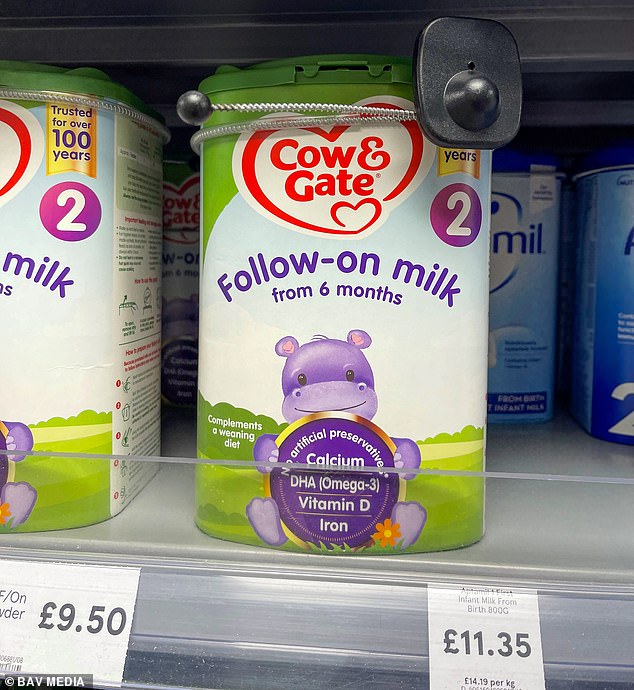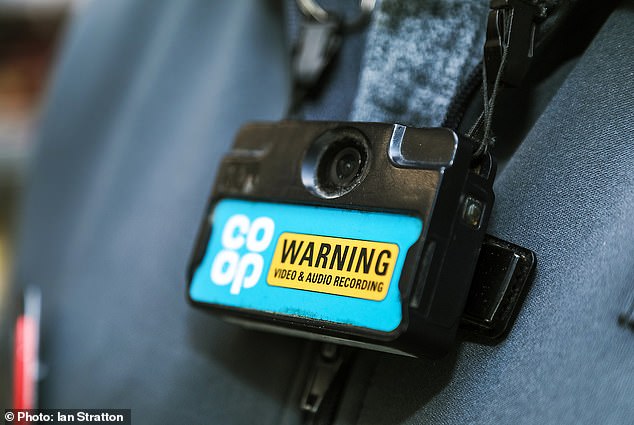Table of Contents
Britain is facing an epidemic of shoplifting.
Retailers are losing a lot of money due to theft and the problem only seems to get worse.
An annual survey by the British Retail Consortium, which represents more than 200 of the UK’s largest retailers, found that theft incidents in 2023/24 had more than doubled to 16.7 million.
The Government has promised to crack down on shoplifting, including repealing legislation which meant thefts worth less than £200 were subject to less severe punishment.
Big Brother: Some supermarkets have introduced body cameras for staff to help stop shoplifting
A new centralized police unit, created earlier this year, also seeks to crack down on prolific shoplifters.
Despite this, retailers are taking matters into their own hands and introducing new, far-reaching measures to crack down on organised criminals targeting their stores.
This has also sparked some outrage from shoppers, who are uncomfortable with the introduction of security labels on essential items and the increased use of CCTV.
We analyse what measures large supermarkets have taken to curb the scourge of theft.
Security labels and plastic boxes
Seeing plastic boxes and security labels has become a common sight in most major supermarkets since the start of the cost of living crisis.
Social media has been flooded with images of safety labels on items such as baby formula, meats and cheeses.
The Co-op recently placed £2 chocolate bars in safe deposit boxes, while also locking away other items such as baby formula, meats and cheeses.
The supermarket also said it had included “dummy” or empty packages and had limited products on the shelves of the worst-affected stores.
Other retailers have introduced similar measures to curb theft. Tesco has placed Grenade protein bars, which cost £2, as well as cans of Monster energy drinks behind security tags.
Discount retailer Aldi also introduced security labels for its £1.29 chocolate bars earlier this year.
Most often, these measures are introduced on a store-by-store basis, at the discretion of individual store teams, and are not implemented across all stores.

Tesco is one of many retailers that have introduced security tags for essential items.
However, items that are placed in security boxes or labels tend to be higher value items, such as olive oil and alcohol.
Olive oil, which is becoming increasingly expensive due to the harsh conditions in the Mediterranean, has become the latest victim of the epidemic of theft.
Tesco introduced net bags and security labels for olive oil when the price of some bottles was approaching £20, although cheaper bottles have also been labelled.
Shoplifters also often target the alcohol aisles, with most supermarkets now introducing security tags or net bags as a deterrent.
Some supermarkets have moved bottles of more expensive alcoholic drinks, such as liqueurs and champagne, to counters that are only accessible to staff. However, other lower-value bottles on display in the aisles also have security labels.
Anti-theft tags and safety deposit boxes can only be removed by staff at the checkout, otherwise they will trigger alarms upon exit.
Alcohol cabinets
Tesco recently introduced lockable liquor cabinets to deter shoplifters in some of its stores.
The idea is that the bottles are locked before the door is unlocked remotely, without waiting for a Tesco employee to unlock it.
Customers press a button on a screen attached to the cabinet, wait 10 seconds for the doors to open, and choose the bottle they want.
Tesco says no cameras or facial recognition software are used.
For now, the supermarket has opted to place only a few sparkling wines, champagne and spirits behind the display cases.
This is Money visited a store in Perivale, west London, to see the alcohol shelves in person. One employee told us that the store had been pilfered with food, drinks and even electric toothbrushes.
Self-pay cameras
CCTV has long been a feature of high street shopping, from large retailers to smaller convenience stores.
Retailers are now increasing the use of CCTV in stores to help combat theft.
Holland & Barrett recently announced it would add new remote-access CCTV cameras and increase the use of body cameras in another 80 stores.
Supermarkets including Waitrose, Tesco and Sainsbury’s have also introduced CCTV cameras at self-checkouts in a bid to boost surveillance of their stores.
Big Brother cameras in the liquor aisles
At an Essex branch of a major Sainsbury’s, the supermarket has put up screens above the alcohol aisle showing they are filming the consumer via CCTV.
This means you can see yourself on the screen and is used as a deterrent to those thinking of stealing alcohol.
Body cameras
Lidl recently announced that its staff would begin wearing body cameras in an attempt to curb shoplifting, following a rise in theft and violence towards its employees.
Ryan McDonnell, CEO, said: “While our stores are generally safe environments, retail crime is something that is affecting the entire industry.”
While they will not be mandatory for all staff members, Lidl said staff “will receive training to ensure the cameras are used safely and in a way that protects the privacy of the individual.”
Co-op also introduced body cameras that send real-time images and audio to its security operations center at the touch of a button.
He also said he had security guards, both undercover and not, who were specially trained to stop criminals.
Other supermarkets have also increased the presence of security guards.
Scanning receipts
Sainsbury’s came under fire last year for installing security gates that force customers to scan their receipts at self-checkouts before being allowed to leave.
Barriers prevent customers from leaving stores until receipts are scanned, meaning those who leave empty-handed have to ask security staff to let them out.
At the time, Sainsbury’s told Mail Online the doors were used in a “small number” of its stores and were part of a “range of security measures”.
SAVE MONEY, EARN MONEY

Boosting investment

Boosting investment
5.09% cash for Isa investors

Cash Isa at 4.92%

Cash Isa at 4.92%
Includes 0.88% bonus for one year

Free stock offer

Free stock offer
No account fees and free stock trading

4.84% cash Isa

4.84% cash Isa
Flexible ISA now accepting transfers

Transaction fee refund

Transaction fee refund
Get £200 back in trading commissions
Affiliate links: If you purchase a product This is Money may earn a commission. These offers are chosen by our editorial team as we believe they are worth highlighting. This does not affect our editorial independence.
Some links in this article may be affiliate links. If you click on them we may earn a small commission. This helps us fund This Is Money and keep it free to use. We do not write articles to promote products. We do not allow any commercial relationships to affect our editorial independence.

